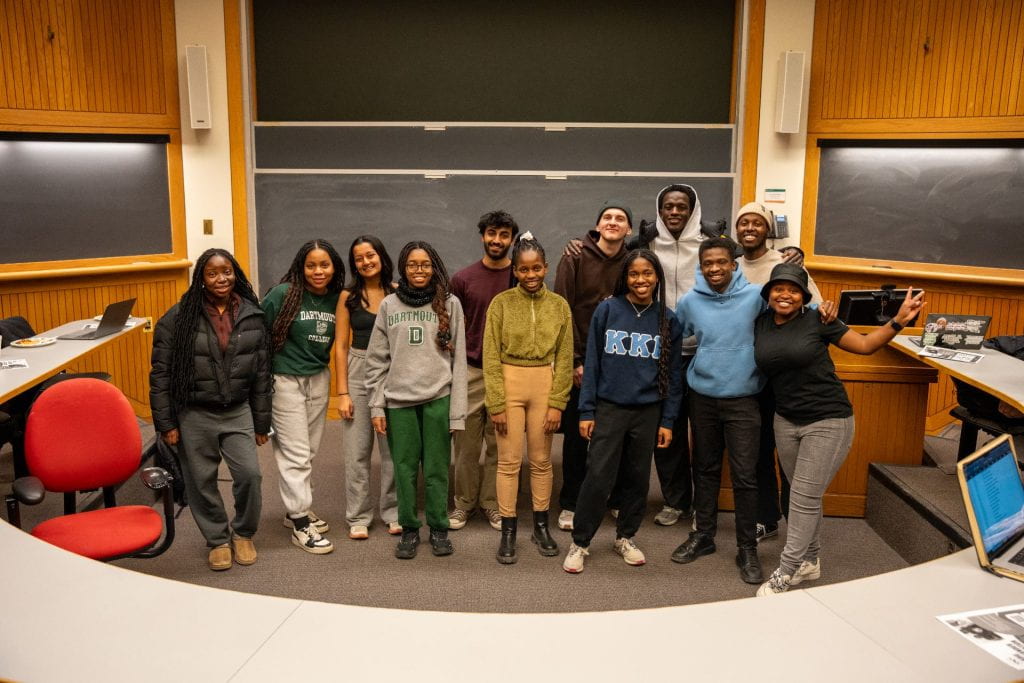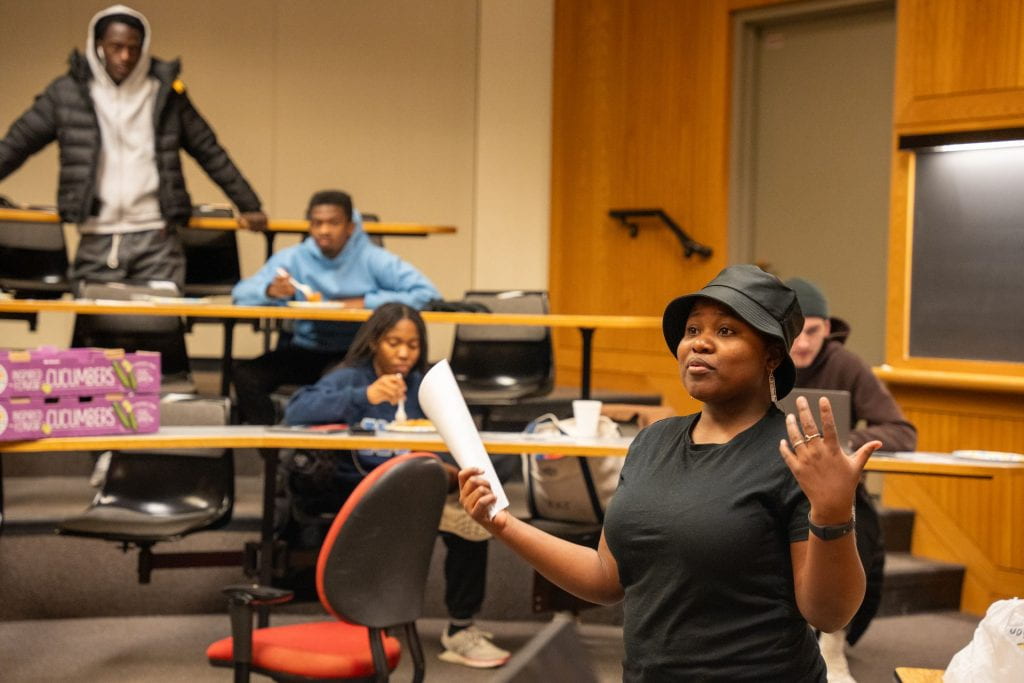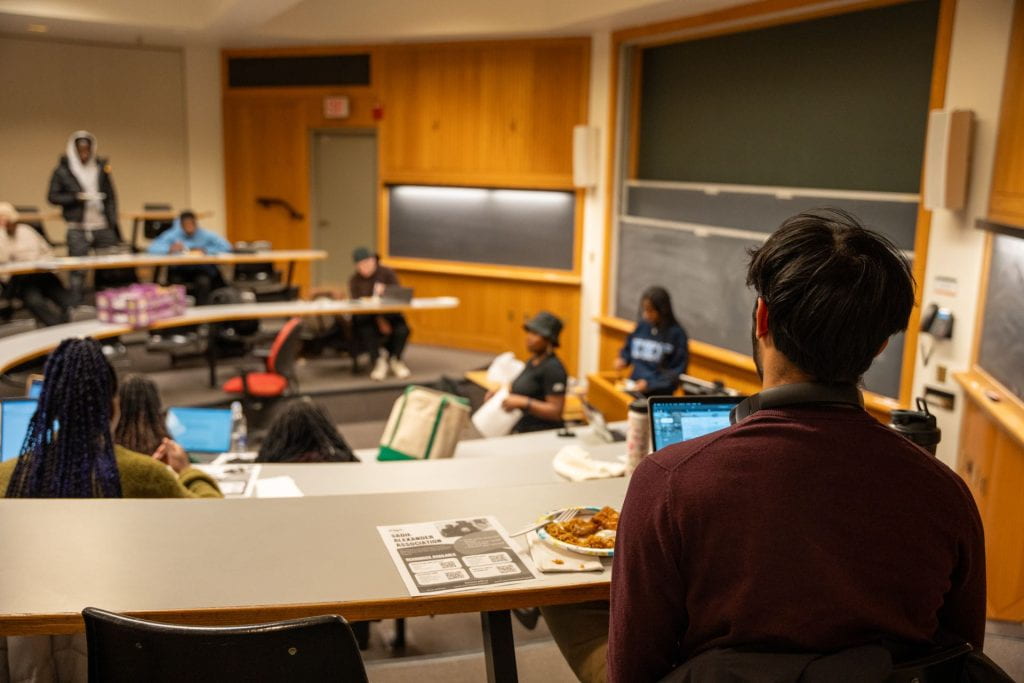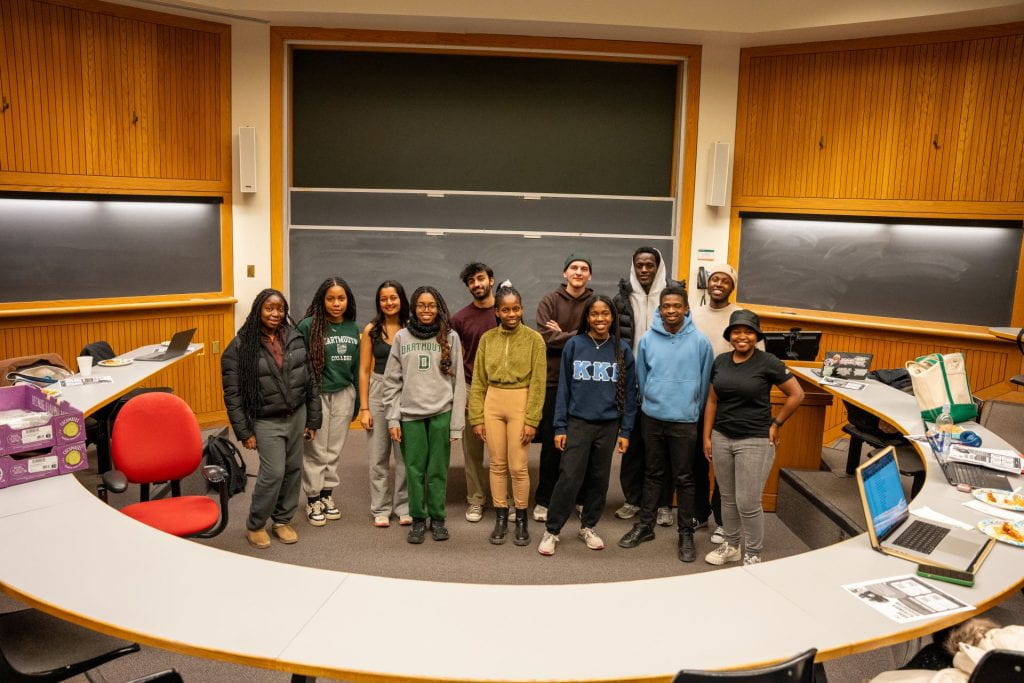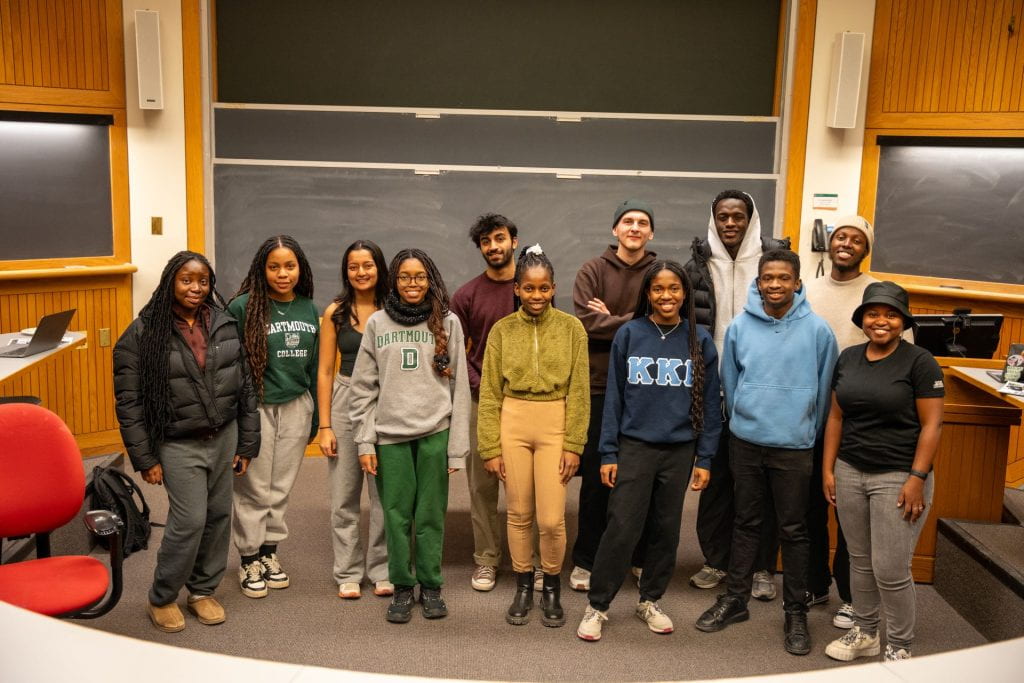News and updates
SAA invites students for spotlights
Since our inception, we have met multiple members. Over time, we have learnt that everyone's story is unique in its own way and thats what shapes our identities. We would like to invite SAA members to share their stories and career goals to be shared on our website. Please fill in this survey and we will write a story shared on our socials and our website!

Students, Economics Department Collaborate on Inclusivity
Posted on March 09, 2023 by Bill Platt
Sadie Alexander Association supports underrepresented minority and first-gen students.

Francina Kolluri ’24 is on the leadership council of the Sadie Alexander Association. (Photo by Katie Lenhart)
Francina Kolluri ’24 arrived at Dartmouth thinking she was on a pre-med track. Her high school in Maryland had a strong science, pre-nursing, and pre-professional program, but no social science curriculum.
Then she took an introductory economics class and loved it, but felt like the other students were native speakers in a field of study that was new to her.
“I came from an underresourced high school, and I’ve always lived in low-income communities, so prior to Dartmouth, I didn’t really know what econ was. I’d heard of it. It was a distant idea. I’d never known anyone who had a degree in it or really what you could do with an econ degree,” she says.
She was feeling discouraged that first fall when she ran into Mothibi Penn-Kekana ’22, an economics and environmental studies major and Academic All Ivy soccer player who lived in the same East Wheelock dorm. He told her about the Sadie Alexander Association, a group founded by minority economics students in 2021 to provide support to underrepresented minority and first-generation students, and to help the Department of Economics explore ways to become more inclusive.
The Sadie Alexander Association’s focus is on encouraging students from underrepresented groups to give economics a look.
“I had just taken an Econ 1 exam and I was venting to him about how badly I think I did, and he said there is this organization, if you need support come to our meetings, and so I just very casually started going to meetings, but I found a really close-knit community that was really special to me,” says Kolluri, who is now on the leadership council of the association.
Jenique Richards ’22, a first-generation college student who is now an underwriter for Travelers Insurance in her home state of Connecticut, co-founded the Sadie Alexander group with Penn-Kekana and Laura Francisco ’22.
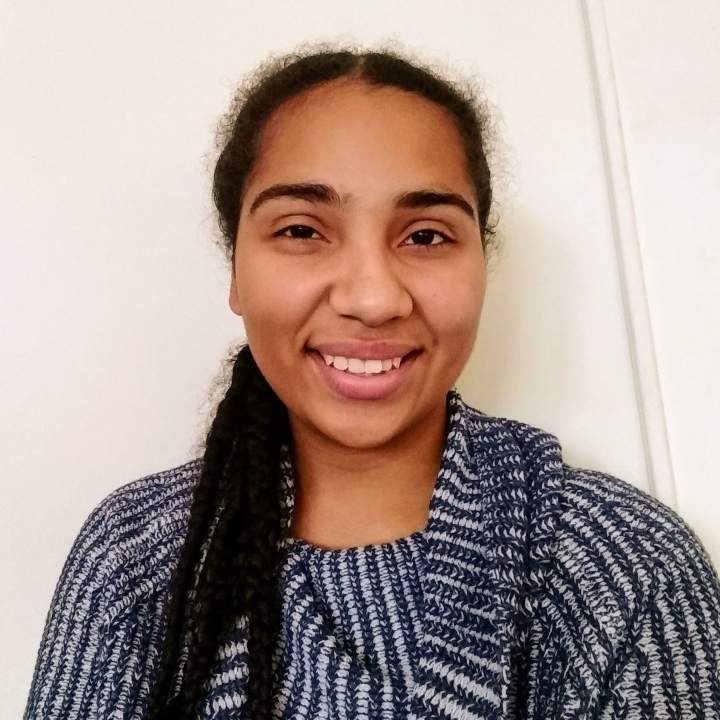
Jenique Richards ’22, who was a first-generation college student, co-founded the Sadie Alexander Association. (Photo courtesy of Jenique Richards)
“The social unrest following the murder of George Floyd caused the economics department to re-evaluate what the student demographic makeup of the department was, and to see there’s a vast underrepresentation of historically underrepresented minorities. So they decided to talk to some students who were currently majors,” says Richards, who double-majored in math and economics.
Department chair Andrew Samwick, the Sandra L. and Arthur L. Irving ’72a P’10 Professor of Economics, says efforts to build a more inclusive scholarly environment accelerated with the department’s Statement on Racial Justice in June 2020.
“Instrumental to that commitment was greater engagement with students from historically underrepresented groups, and we have been very fortunate to have the collaboration of the Sadie Alexander Association,” says Samwick. “The group’s founders and subsequent leadership have enabled us to better understand the concerns and aspirations of our students.”
The association also works with the department to host events such as the Lectures on Inequality, Discrimination, and Opportunity “that showcase the role of economics in understanding and helping to address complex social challenges,” Samwick says.
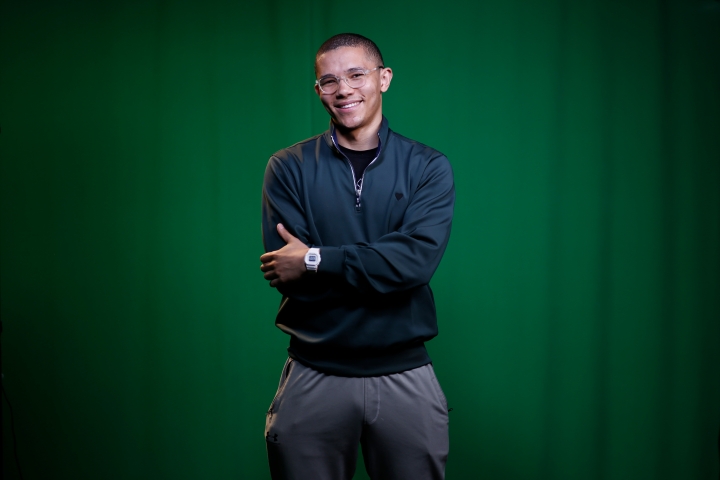
Mothibi Penn-Kekana ’22 co-founded the Sadie Alexander Association. (Photo courtesy of Mothibi Penn-Kekana)
“All the senior economics professors would get feedback directly from us. What’s hard, what’s good, what could be better,” says Penn-Kekana, who now works in mergers and acquisitions for Goldman Sachs in his native London. Throughout the process, he says, “They were willing to listen to us and they wanted to show us, ‘we care, and this is a priority, and this is what we’re trying to do.’”
Claudia Olivetti, the George J. Records 1956 Professor of Economics, was a member of the economics department’s diversity committee when the association was coming together.
“We’re learning from them, they’re learning from us. It really goes both ways,” she says. “The most important thing is to keep communication open.”
When the students started writing the charter for the new group, Sadie Alexander’s name came up in discussions of the history of the discipline, says Olivetti, now an adviser to the group. In 1921, Alexander became the first Black woman in the United States to receive a PhD in economics, but she was never granted a university position in her field. She earned a law degree from the same university, University of Pennsylvania, in 1927 and was a practicing lawyer and civil rights activist until her death in 1989.
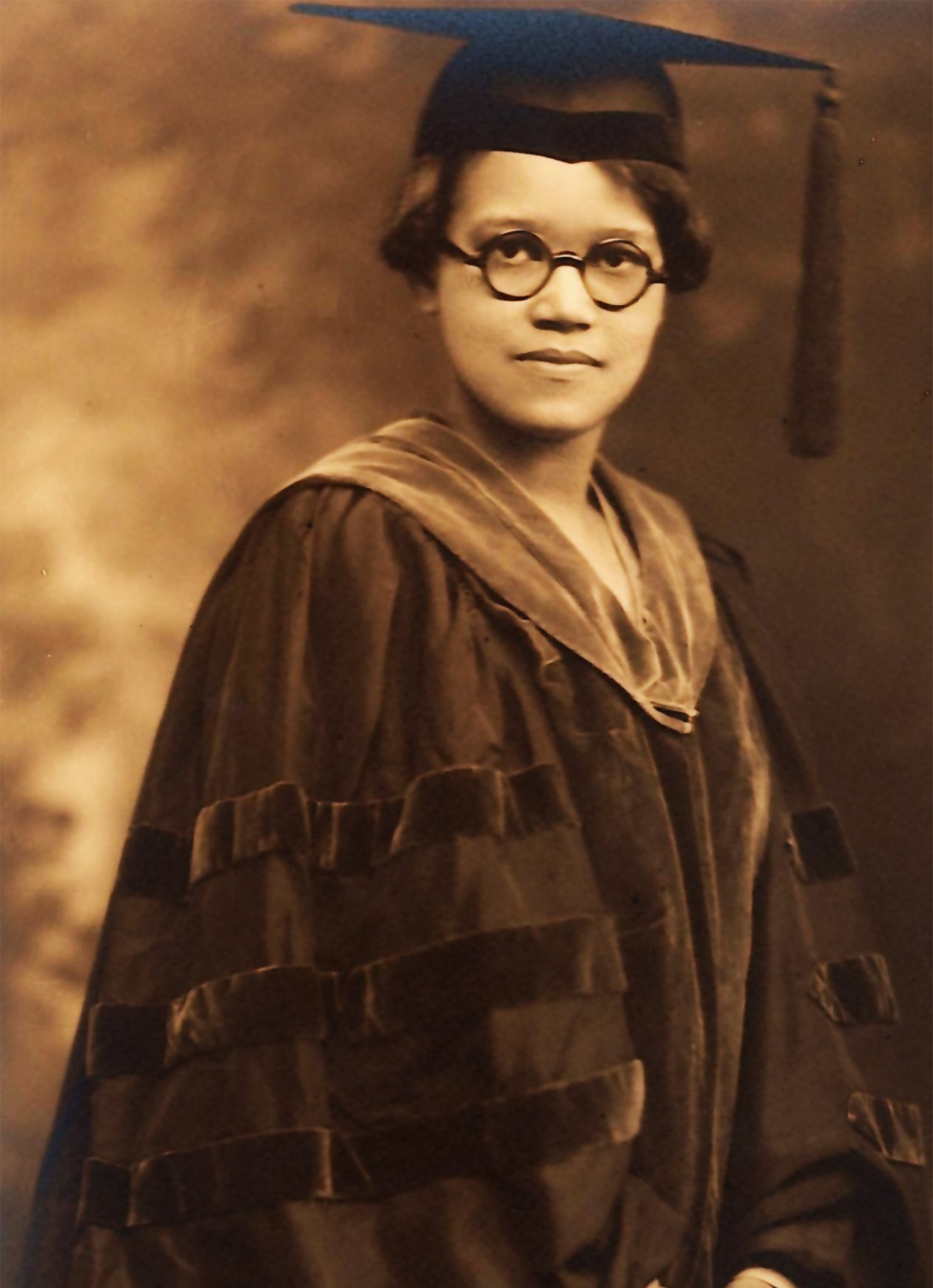
Sadie Alexander in 1921 became the first Black woman in the United States to receive a PhD in economics, but she was never granted a university position in her field. (Courtesy of the University of Pennsylvania Archives)
“They were really inspired by the story of Sadie Alexander. They thought, even if she didn’t have a chance to be an economist—being both a woman and Black—they would honor her,” says Olivetti, who was herself a first-generation college student.
Professor of Economics Andrew Levin, co-adviser with Olivetti, says celebrating Alexander, who was just named, posthumously, a distinguished fellow by the American Economic Association last April, should remind academics in the field of how much more work needs to be done.
“That’s the bigger picture. At universities and colleges across the country, many are eager to have more diverse members in their departments. But getting the flow of underrepresented minority and first-gen students all the way along that pipeline—going on to graduate school, becoming faculty, becoming economists, becoming role models—we have a long way to go,” says Levin.
While career tracks and the “pipeline” are important, the Sadie Alexander Association’s focus is on encouraging students to give economics a look, says Richards.
“It’s not really about what your career will be, it’s initially about doing well in economics classes that term.”
Kolluri says the support and guidance of students from similar backgrounds who have succeeded in the field has helped her in many ways.
“The Sadie Alexander Association was also a large part of me selling this idea of econ to my parents,” says Kolluri, who will be interning this summer for Bank of America as a corporate banking analyst.
“Talking to my parents about this support group was huge, because when I told them that I wanted to do a banking internship, they thought that I wanted to become a teller. They were like, ‘I don’t think that’s very well-paid.’ But I said, don’t worry, there is a good path for me at Dartmouth.”
Happy Hispanic Heritage Month
To celebrate Hispanic Heritage Month, we highlight some distinguished scholars and educators making impact in the Economics field.
Welcoming the Class of 2027 to SAA
On the 5th of October, we had the pleasure of personally introducing the new Class of '27 students to the Sadie Alexander Association. It was an opportunity for face-to-face connections and warm welcomes. We shared our club's mission, values, and the myriad of exciting activities and opportunities that await them as members, making it an engaging and inspiring start to their journey with the Sadie Alexander Association. It was also an opportunity to reconnect with members as we start the new academic year!
Congratulations ’22s!!
In the class of 2022, we had 5 members who not only founded this organization, but ensured that the path for those to follow was as smooth as possible. They symbolize leadership, authenticity and tenacity that we hope to cultivate in every one of our members. Below, we highlight their great academic achievements:
- Jenique Richards: Graduating with a double major in Economics and Mathematics with a minor in Music
- Mothibi Penn-Kekana: Graduating with Honors in Economics and Environmental Studies
- Arthur Raines: Graduating with High Honors in Economics and presenting a thesis titled: The impact of fluctuations in the price of gold on education in Tanzania
- Laura Francisco: Graduating with a double major in Quantitative Social Science and Economics
- Tinotenda Kuretu: Graduating with a major in Economics and a minor in Anthropology.
The diversity of interests, thought and the depth of knowledge leaves a huge impact on our members. It also carries them to be remarkable leaders of the world and we cannot wait to see what they can accomplish in the future! Good luck in your future endeavors. Congratulations again '22s!!
Sadie Alexander named AEA Distinguished Fellow

The American Economic Association (AEA), publisher of top Economics journal American Economic Review, has named Dr. Sadie Alexander a Distinguished Fellow for 2022.
According to Dartmouth Professor Erzo Luttmer, this is the first time that the AEA has nominated a deceased economist. The Distinguished Fellow is an honor is awarded to economists for their research and their professional career.
As members of the Sadie Alexander Association, we are proud and delighted to see our namesake honored for her contributions to the field of Economics. Through this posthumous award, we hope that Dr. Alexander's legacy will continue.
SAA Celebrates Martin Luther King Day
As Martin Luther King Day and Black History Month approaches, we reflect on Dr. King's legacy and his dream for a world in which Black people are not "judged by the color of their skin, but the content of their character." Dr. King and the Civil Rights Movement at large fought for equal rights in an America where those rights were not afforded for people of color. The Civil Rights Movement lead to improvements in the quality of life for Black people, particularly through the passing of the Civil Rights Act of 1964 and 1965 and the dismantling of Jim Crow legislation in the South.
As far as we have come, we still have so far to go. The murder of George Floyd in 2020 and the ensuing social unrest exemplifies this very fact.
While there is work to be done on many levels, SAA strives to make positive change in academia. We hope to create a better learning environment and better career opportunities for underrepresented minority students. No student should feel unsupported or isolated in the classroom or in their search for a career.
As we commemorate Dr. King's legacy, we leave you with an excerpt from his infamous "I Have a Dream" speech:
And if America is to be a great nation, this [dream] must become true. And so let freedom ring from the prodigious hilltops of New Hampshire. Let freedom ring from the mighty mountains of New York. Let freedom ring from the heightening Alleghenies of Pennsylvania. Let freedom ring from the snowcapped Rockies of Colorado. Let freedom ring from the curvaceous slopes of California. But not only that, let freedom ring from Stone Mountain of Georgia. Let freedom ring from Lookout Mountain of Tennessee. Let freedom ring from every hill and molehill of Mississippi. From every mountainside, let freedom ring.
And when this happens, and when we allow freedom ring, when we let it ring from every village and every hamlet, from every state and every city, we will be able to speed up that day when all of God's children, Black men and white men, Jews and Gentiles, Protestants and Catholics, will be able to join hands and sing in the words of the old Negro spiritual: Free at last. Free at last. Thank God almighty, we are free at last.
Dr. Martin Luther King, Jr. "I Have a Dream" speech, Aug. 28, 1963
’25s: Learn about Econ at Dartmouth!
In conversations held with the Economics Department's Diversity Committee, SAA advised the Committee to show what economics can offer for underrepresented minority and/or first-gen/low-income students who may have little to no experience with the subject. We advised that this process should happen as soon as possible for first-year students. Well, the Economics Department delivered!
On August 2nd, the Econ Department will be hosting a virtual tour of the department where incoming first-year students will be able to learn about economics and what the Economics Department offers. In addition to an introduction the field of study and a brief overview of what the department offers, you will be able to speak with faculty and current Economics majors about their experiences in economics. Members of SAA will be speaking at the event and taking part in the conversations!
The event will take place from 2pm to 5pm EDT. If you are an incoming student interested, please RSVP at the link provided in the email sent by the department chair, Professor Andrew Samwick.
Welcome to Dartmouth and we hope to see you there!
COSO Recognition
As of April 21st, the Sadie Alexander Association is officially recognized by the Council of Student Organizations (COSO)! We are thankful to COSO for recognizing the necessity of a group like SAA for Dartmouth College.
We would also like to thank our faculty advisors Professor Andrew Levin and Professor Claudia Olivetti, and the Economics Department for their support and guidance throughout the process of the formation of this organization.
COSO recognition will give us the ability to reach more people in the Dartmouth community as well as help us host events that will be beneficial to Black and minority students interested in economics.
